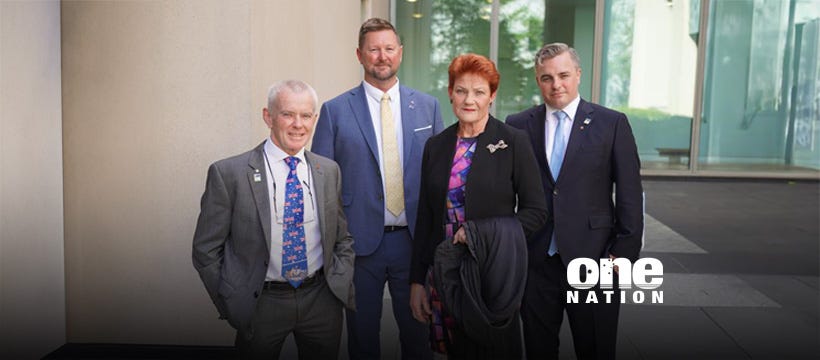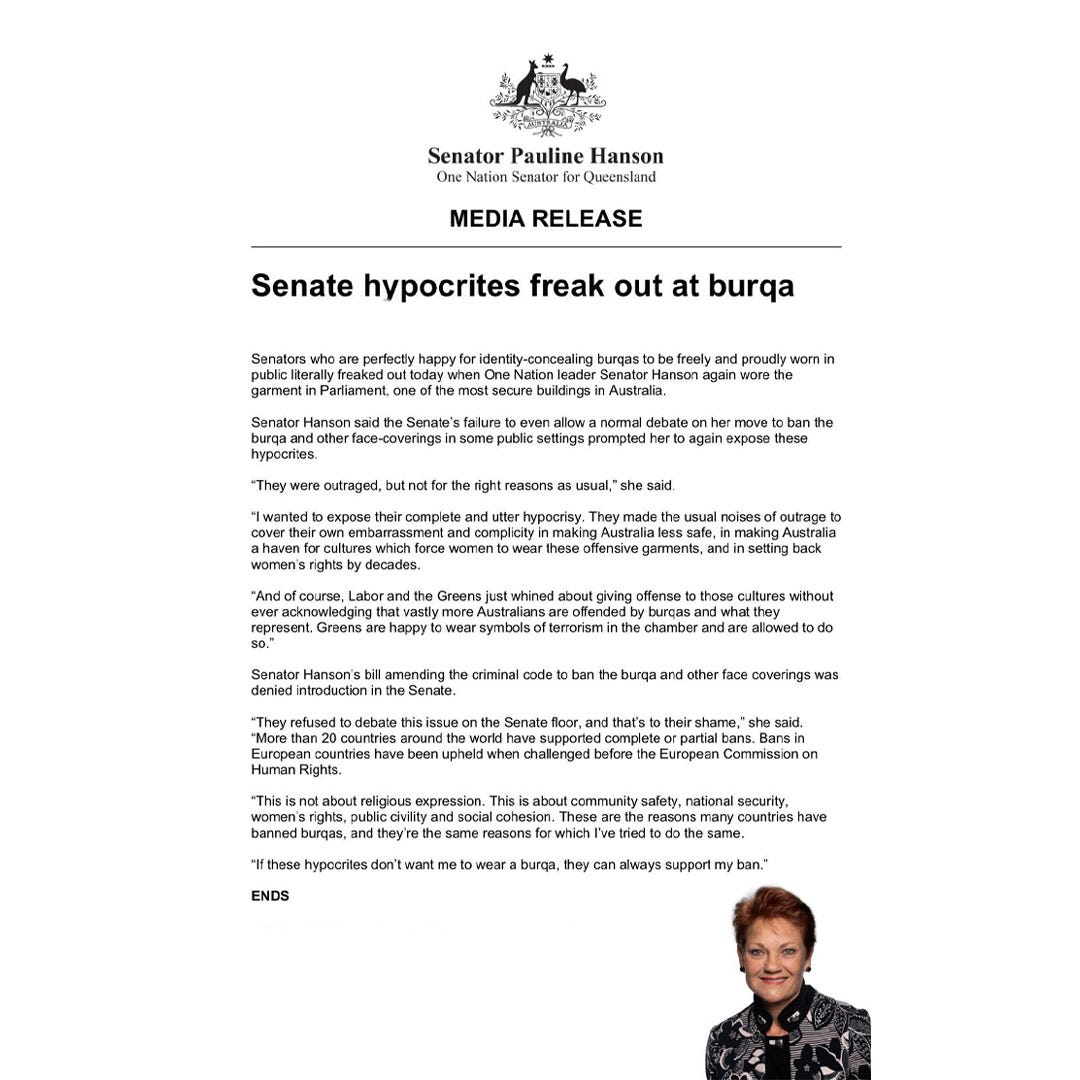One Nation's Burqa Ban Bill Blocked Before Debate, Highlighting Private Member's Bill Obstacles
This piece is freely available to read. Become a paid subscriber today and help keep Mencari News financially afloat so that we can continue to pay our writers for their insight and expertise.
Today’s Article is brought to you by Empower your podcasting vision with a suite of creative solutions at your fingertips.
Pauline Hanson’s attempt to legislate a ban on full-face coverings in public spaces was shut down before parliamentary debate could begin, stymied by a procedural mechanism that allows a single senator to block private member’s bills—exposing the near-insurmountable hurdles facing minor party legislation in Australia’s upper house.
The One Nation leader’s private member’s bill seeking to prohibit burqas and other full-face coverings was denied introduction to the Senate yesterday when independent Tasmanian senator Tammy Tyrrell and Greens senators exercised their right to object, preventing the legislation from advancing to the debating floor.
“Without even allowing me to introduce the bill, they denied me that right,” Hanson told reporters. “Tammy Tyrrell from Tasmania denied me that right, and so did the Greens. One voice, that’s all it takes. There was two.”
The blocked legislation would have banned full-face coverings in public spaces, government buildings, and transportation systems, according to Hanson’s public statements—though the full bill text was never formally tabled in the Senate due to the procedural objection.
Truth matters. Quality journalism costs.
Your subscription to Mencari directly funds the investigative reporting our democracy needs. For less than a coffee per week, you enable our journalists to uncover stories that powerful interests would rather keep hidden. There is no corporate influence involved. No compromises. Just honest journalism when we need it most.
Not ready to be paid subscribe, but appreciate the newsletter ? Grab us a beer or snag the exclusive ad spot at the top of next week's newsletter.
How Private Member’s Bills Work
Private member’s bills are legislative proposals introduced by senators or members of Parliament who are not government ministers. Unlike government bills, which receive guaranteed debate time and procedural priority, private member’s bills face significant obstacles in reaching the Senate floor.
Under Senate standing orders, introducing a private member’s bill requires either unanimous consent or allocated debate time from Senate leadership. A single senator’s objection—colloquially known as a “voice objection”—can prevent introduction entirely, as occurred with Hanson’s legislation.
Approximately 90% of private member’s bills fail to become law, according to parliamentary records. Success typically requires either major party support or cross-party negotiation to secure debate time and voting procedures.
The Australian Senate considered 47 private member’s bills in 2024, with only three advancing beyond the introduction stage to substantive debate, and none becoming law.
Legislative History of Ban Attempts
This represents Hanson’s second formal attempt to legislate restrictions on full-face coverings. She previously introduced similar legislation in 2017, which was similarly blocked from advancing to debate.
“They threw it out. They wouldn’t even vote on it, did nothing about it,” Hanson said of the previous attempt. “If they had done that seven years ago, I would never have been able to wear the burqa.”
No Australian state or federal government has successfully enacted blanket bans on full-face coverings, though some jurisdictions require face identification in specific contexts. New South Wales and Victoria require individuals to remove face coverings when requested by police for identification purposes under certain circumstances.
Several Australian politicians have proposed burqa restrictions over the past 15 years, but none have advanced past preliminary parliamentary stages. The federal Liberal-National Coalition government rejected calls for restrictions in 2010, 2014, and 2017.
International Comparisons
Hanson cited international precedents in defending her proposed legislation. “24 countries around the world, including Islamic countries, have actually banned the burqa,” she said. “So we have to take note of this. Why have they banned it? And mostly it’s because they want assimilation.”
France became the first European country to ban full-face coverings in public in 2011. Belgium, Denmark, Austria, the Netherlands, and Bulgaria have since enacted similar restrictions, typically framing them as security measures or assertions of secular values rather than targeting specific religious garments.
Several Muslim-majority nations including Tunisia, Morocco, and Chad have restricted or banned full-face veils in certain public spaces, citing security concerns following terrorist incidents. However, the vast majority of Muslim-majority nations have not enacted such bans.
The European Court of Human Rights has upheld France’s ban as not violating religious freedom, ruling in 2014 that the law served a legitimate aim of “living together” in French society. However, human rights organizations including Amnesty International have condemned such bans as disproportionate restrictions on religious expression.
Opposition Perspectives
Greens senators who blocked Hanson’s bill have consistently argued that religious freedom protections should take precedence over assimilation concerns, though no Greens senator issued public statements specifically addressing yesterday’s procedural objection.
The party’s 2025 policy platform states that “religious dress including hijabs, burqas, turbans, and yarmulkes are expressions of faith protected under Australian human rights law.”
Tasmanian independent senator Tammy Tyrrell has not issued public comments explaining her objection to the bill’s introduction. Tyrrell’s office did not respond to requests for comment on her rationale for blocking the legislation.
Islamic advocacy organizations including the Australian National Imams Council have previously stated that full-face coverings are not religious requirements in Islam but rather cultural practices observed by some Muslim women. The Council has opposed legislative bans while supporting women’s right to choose their dress.
Hanson’s Broader Vision
The One Nation leader framed her burqa ban proposal as part of a broader legislative agenda addressing what she characterizes as inadequate cultural integration. “It’s not about incidents,” she said when asked whether specific security incidents prompted her legislation. “It’s having a vision for the future, where the country’s headed.”
Hanson drew parallels to her long-standing opposition to multiculturalism policies, which she argues have failed to promote national cohesion. “I was ridiculed for it at the time. Now you have—even John Howard has come out and said it hasn’t worked,” she said, referring to the former prime minister’s 2006 comments questioning multiculturalism’s effectiveness.
The senator also cited her opposition to climate change policies, COVID-19 restrictions, and the Indigenous Voice to Parliament referendum as examples of taking positions that later gained broader support. “I’ve been the one who opposed even COVID-19. I’ve opposed the voice based on it wasn’t equal rights for all Australians,” she said.
Procedural Path Forward
With her private member’s bill blocked at the introduction stage, Hanson faces limited options for advancing burqa ban legislation. She could attempt reintroduction at future parliamentary sessions, though the same procedural obstacles would apply unless she secures cross-party support or government allocation of debate time.
An alternative path would involve persuading a major party to adopt similar legislation as government or opposition policy, giving it procedural priority. However, neither Labor, Liberal, nor National Party leadership has indicated openness to considering such restrictions.
Hanson could also attempt to negotiate with crossbench senators to secure debate time through Senate scheduling procedures, though this would require support from multiple independent and minor party senators who have shown no indication of backing her position.
The most realistic avenue for advancing the policy would be through a Senate inquiry or committee investigation into facial identification laws, which could examine the issue without requiring legislative action. Hanson’s party could request such an inquiry, though establishing one requires majority Senate support.
What Happens Next
Hanson’s burqa ban legislation remains permanently stalled unless she finds a pathway around procedural objections. The seven-day suspension following her protest wearing of a burqa in Parliament further limits her immediate ability to pursue the issue legislatively.
Parliament returns from summer recess in February 2026, when Hanson could theoretically reintroduce the legislation. However, without changed political dynamics or new crossbench support, the same procedural blocks would likely apply.
The upcoming federal election, due by May 2026, could reshape the Senate’s composition and create new opportunities for minor party legislation. However, current polling suggests One Nation is unlikely to gain additional Senate seats that would strengthen Hanson’s procedural position.
The issue may resurface through other policy debates, including discussions of counter-terrorism measures, religious freedom legislation, or cultural integration policies. However, no major party has indicated plans to prioritize facial covering restrictions in the next parliamentary term.
Sustaining Mencari Requires Your Support
Independent journalism costs money. Help us continue delivering in-depth investigations and unfiltered commentary on the world's real stories. Your financial contribution enables thorough investigative work and thoughtful analysis, all supported by a dedicated community committed to accuracy and transparency.
Subscribe today to unlock our full archive of investigative reporting and fearless analysis. Subscribing to independent media outlets represents more than just information consumption—it embodies a commitment to factual reporting.
As well as knowing you’re keeping Mencari (Australia) alive, you’ll also get:
Get breaking news AS IT HAPPENS - Gain instant access to our real-time coverage and analysis when major stories break, keeping you ahead of the curve
Unlock our COMPLETE content library - Enjoy unlimited access to every newsletter, podcast episode, and exclusive archive—all seamlessly available in your favorite podcast apps.
Join the conversation that matters - Be part of our vibrant community with full commenting privileges on all content, directly supporting The Evening Post (Australia)
Catch up on some of Mencari’s recent stories:
It only takes a minute to help us investigate fearlessly and expose lies and wrongdoing to hold power accountable. Thanks!









